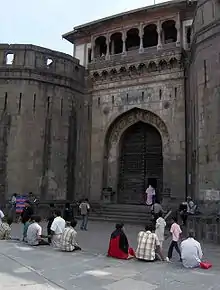College of Engineering, Pune
College of Engineering Pune (COEP), is a college affiliated to Savitribai Phule Pune University in Pune, Maharashtra, India. Established in 1854, it is one of the oldest engineering colleges in India, after College of Engineering, Guindy, Chennai (1794) and IIT Roorkee (1847).[2][3][4] The students and alumni of College of Engineering, Pune are colloquially referred to as COEPians.[5]
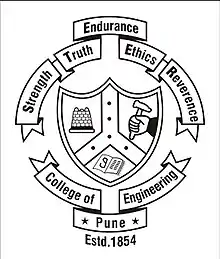 | |
| Motto | Strength Truth Endurance Ethics Reverence |
|---|---|
| Type | College |
| Established | 1854 |
| Chairman | Vijay Bhatkar[1] |
| Director | Dr. B. B. Ahuja |
Academic staff | 20[1] |
Administrative staff | 400 |
| Students | 3,800 |
| Undergraduates | 2,800[1] |
| Postgraduates | 1,000 |
| Address | Wellesly Road , , , Shivajinagar Pune 411 005 India |
| Campus | Urban, 36.81 acres (currently under demarcation for development purpose) |
| Website | www.coep.org.in |
History
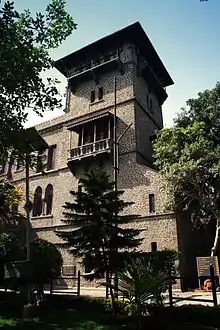
The college was one of the first few colleges established by the British to serve the Indian subcontinent. The foundation stone of the new college was laid by the Governor of Bombay, Sir Bartle Frere, who was to become the Vice-Chancellor of the University, on 5 August 1865.[6][7][8] In June of the following year, Theodore Cooke M.A., was appointed the Principal. He went on to hold the office for next 28 years.[6][9]
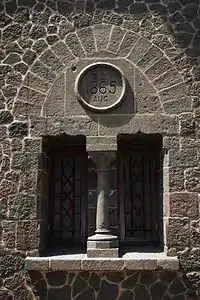
Initially, it was started on 16 December 1854, to train public works department (PWD) officials and was housed in three bungalows as the 'Poona Engineering and Mechanical School' to train subordinate officers for carrying out public works like buildings, dams, canals, railways and bridges.[2][4][10][11][12] In July 1857, Henry Coke was given the charge of the institute.[13] Admission was open to all, irrespective of nationality or caste.[13] Good proficiency in English and basic knowledge of Mathematics were a prerequisite for getting admitted to the institute.[13] The process of admission required that the aspiring candidate apply to the nearest government English school, to whom the entrance examination papers were handed over.[13] The headmaster would take the examination on a date deemed convenient to him and submit the answer sheets to Henry Coke, the in-charge of the mechanical school.[13] After examining the papers, Coke would notify the headmaster of the school with the names of candidates who were deemed fit for admission. Scholarships of ₹ 6 were offered per month after a period of six months of training in the mechanical school for fifteen students. The courses offered included Mathematics, Drawing, Surveying and levelling, building and construction and setting out works on the ground.[13] The course would run for a period of two years.[13]
Later on, in the year 1864, the school became the "Poona Civil Engineering College". The number of courses were increased to include forestry and agricultural subjects, which led to its name being changed to Poona College of Science. The college was inaugurated at the new premises on 5 August 1865, at the hands of then governor Sir Bertel Ferre. It started a course in licensed and civil engineering (LCE) and trained masons and overseers. Later it secured affiliation to the Bombay university. The course was revised in 1886 and the minimum criteria required for admission was raised from Matriculation to the then Previous Examination.
In 1909, the LCE was converted into the BE degree and the first batch of students passed out in 1912. The name 'Government college of engineering, Pune' was taken up only in 1911. All non-engineering courses were stopped by 1911, transferring the Bachelor of Science degree to the Science Institute of Bombay and subsequently in the year 1911, the name was changed to the "Government College of Engineering, Poona".
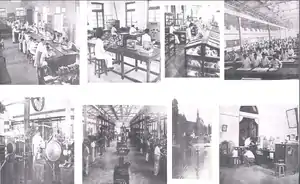
The institution was initially affiliated to the University of Bombay (now Mumbai) for a degree of Licentiate in Civil Engineering known as LCE in 1858.[2][14] The certificate course was converted into a degree course and the first class of the Bachelor of Engineering degree graduated in the year 1912. After the University of Poona (now Savitribai Phule Pune University) was established in 1948, the college became affiliated to the new university. In 1968, the three-year degree was extended to 4 years constituting 8 semesters.
In 2003, the institute was granted complete autonomy by the State Government of Maharashtra, thus giving it the freedom to set its own curriculum and manage its own finances.[8] With permanent affiliation to the Savitribai Phule Pune University, the institute now is an autonomous engineering school. This has been the biggest change as far as pedagogy at COEP is concerned. The following years have seen a multitude of positive changes in administration and academic strategies. Many of these have been responsible for the growing innovation in project work of college students. The institute contends that its autonomy now grants it greater flexibility in dynamically changing its syllabus to suit the changing needs of the industry.
Campus
The Main Hall
The main hall is the present day administrative building of the College. It houses the Director, the Dean Academic Affairs, the Dean Student Affairs, the Gymkhana, the Examination cell and other various important administrative heads of the college. The original building was almost three floors tall with a base floor length of 18 meters and a width of 9 metres. The hall was recently refurbished and the inauguration of the restored heritage building (pictured below) took place on 24 March 2012 by Sharad Pawar, Minister of Agriculture, Government of India.[15]
Academics
Accreditation
The National Board of Accreditation, has accredited all programmes under Tier-2 (General) status for a period of 5 years from 2012.[16] In the year 2014, 9 undergraduate programmes were accredited with tier-1 (Washington Accord) status. This particular accreditation gives way to recognition of the quality of undergraduate engineering education offered by the member country and is an avenue to bring it into the world class category. It encourages and facilitates the mobility of engineering graduates and professionals at international level.[17] The tier-1 accreditation is effective from 01/07/2014 for a period of five years.[18]
Undergraduate
Undergraduate admissions to the College of Engineering, Pune are competitive and are based on merit.[19] Earlier admissions were based upon the percentage of science subjects' marks secured in Higher Secondary Certificate exam of Maharashtra state and later on the basis of marks scored in Maharashtra Common Entrance Test.[20][21] However, at present the admissions are conducted on the basis of the marks secured in Maharashtra CET and HSC board combined. These admissions are conducted by the Directorate of Technical Education (DTE) through the Centralized Admission Process (CAP). Affirmative action programs exist for students belonging to socially and economically backward classes as stipulated in the Constitution of India and various statutes. There are programs for students from north-eastern India and Indian citizens from Kashmir. There are also programs for children of people working in Gulf countries, foreign nationals, foreign students and Person of Indian Origin (PIO) in the college. Non-Resident Indians can also apply for the courses. For the year 2015–16 this quota is applicable for admissions to Walchand College of Engineering, Sangli and Laxminarayan Institute of Technology. The reservations for different categories are based on the Government of India and Government of Maharashtra rules. Reservations in seats are provided for SC (Schedule Caste), ST (Schedule Tribes), NT (Nomadic Tribes), OBC (Other Backward Classes), PH (Physically Handicapped) as well as female candidates. It has been included in the Guinness Book of world records, several admissions to direct second year of BTech course are also conducted for those candidates who have completed Diploma in Engineering at different polytechnic institutes in the state of Maharashtra. These admissions are conducted through the Centralized Admission Process (CAP) by DTE itself.[22]
Postgraduate and Doctorate
Postgraduate admissions to the College of Engineering, Pune are also on merit basis. The M.tech admissions are on the basis of the Graduate Aptitude Test in Engineering (GATE) conducted by the seven old IITs and the IISc. Seat reservations are applicable as per the Government of Maharashtra rules. The college also provides Doctor of Philosophy (PhD) programmes in various fields.[23] Department of Applied Sciences is recognised as PhD research centre by S.P. Pune University in the subjects of Environmental Sciences and Chemistry.
Rankings
| College rankings | |
|---|---|
| General – India | |
| NIRF (Overall) (2020)[24] | 101-150 |
| Engineering – India | |
| NIRF (2020)[25] | 50 |
| Outlook India (2019)[26] | 15 |
| The Week (2019)[27] | 21 |
COEP was ranked 15 among engineering colleges in India by Outlook India in 2019.[26] The National Institutional Ranking Framework (NIRF) ranked it 50th in the engineering ranking in 2020[25] and 101-150 overall.[24] It has been ranked number one among the top five government institutions in Atal Ranking of Institutions on Innovation Achievement (ARIIA) in 2020.[28]
Student life
COEP is the hub of various curricular, extra-curricular and technical activities which attracts participation and praise alike from numerous colleges in India.
Zest
COEP’s Annual National-Level Sports Festival, called ZEST.
MindSpark
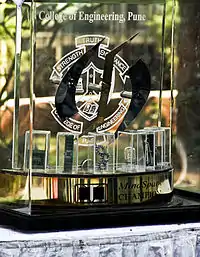
MindSpark is the national level annual technical festival hosted by the college and established in 2007. The idea behind MindSpark originated from the need to unite various departmental level festivals that were scattered across the academic calendar. It features about 50 events across various disciplines of engineering and has been backed by the support of industrial sponsors who also associate with COEP for placement. This event is usually scheduled in an odd semester (around September) and is of 3 days (usually weekend).[29][30]
Regatta
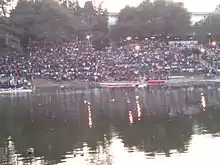
Regetta is an annual regatta hosted by the College of Engineering, Pune. Since its inception in 1928, it has showcased around 165 boats, notably the Eighter, which is one of the oldest boats.[31] The 91st edition of Regatta was held on 10 March 2019. Unlike a Regatta which means a collection of boat races, COEP Boat Club's Regatta is a show of various kinds of boats, kayaks, punts, shell boats and scull boats. The events in this show are Telematches, Kayak Ballet, Shell Games, Punt Formation, Mashaal Dance and the Arrow formation.[32]
Cultural activities & Fests – Impressions
.jpg.webp)
COEP has been one of the leading colleges from Pune in various cultural competitions like Firodiya Karandak,[33] Purushottam Karandak, and Mood Indigo (festival).
In 2016, COEP started its first ever Cultural Fest, Impressions, which is held every year in the 2nd week of December and lasts for 3 days. Impressions was formed as a platform "For the Artists, By the Artists", to provide opportunities for people from the fields of Dance, Music, Theater, Art, and Fashion to display their talent. The events span over six main modules, namely – Dance, Music, Arts and Crafts, Dramatics, Photography, and Writing.[34]
Sesquicentenary celebrations
In 2004, COEP celebrated 150 years of its existence.[8][35] The celebrations were marked by a visit by the Hon. Ex-President of India, Dr. APJ Abdul Kalam.[35] A postage stamp to mark the 150th anniversary of the college was released.[36]
Participation in Guinness World Records
The college has made three entries so far in the Guinness World Record books. It holds the record for "Most people skipping on the same rope", which still stands as the world record[37] and "The longest painting by numbers"[38]
On 4 November 2012, 3248 people solved the Rubik's cube at the same time for breaking the Guinness world record for "Most number of people solving the Rubik's cube". It was previously held by IITB, where 937 students solved the puzzle within 30 minutes in March 2012.[39][40]
Team Nemesis Racing (BAJA Competition)
Baja Competition is an event which comprises designing, fabricating, assembling an all-terrain four wheeler vehicle and running it on a specially prepared torturous track in a grueling competition for four hours.
The College team was declared the overall winner at the Baja SAE India contest 2013 held at Pithampur, near Indore at the National Automotive Testing and R&D Infrastructure Project.[41] The team also won the Best Acceleration, the Raftaar award, Computer-aided engineering award, Best Build Quality, Endurance winner awards.
BAJA 2015 witnessed COEP starting at the pole position in the race consecutively for the fourth time by being the fastest vehicle. COEP received a total of following 9 awards in BAJA competition 2015, Overall-1st, Durability −1st, Acceleration-1st, Hill Climb-1st, Raftaar-1st, Innovation-2nd, CAE −2nd, Build Quality- 2nd, Safest Vehicle −2nd.
BAJA 2016 was held at Pithampur, Indore on 21 February 2016. COEP started at the pole position in the race consecutively for the fifth time by being the fastest vehicle. Out of the 14 award categories, COEP won 11 awards in BAJA competition 2016 retaining the Overall Championship.[42]
COEP team Nemesis won overall championship at BAJA 2017 competition creating a hat trick of records. In the 10th edition of Mahindra BAJA, a total of 415 entries applied for the event from 185 colleges that participated at a virtual stage, out of which 150 teams were selected for m- BAJA, while 35 teams for eBAJA. In the final round or the endurance test, 118 teams participated in the competition which was held from 16 to 21 February 2017 at the NATRIP facility in Pithampur, Indore. Out of the 12 award categories, COEP won 7 awards in BAJA competition 2017 retaining the Overall Championship.[43]
COEP robotics team
COEP's Robotics Team is represented by the Robot Study Circle (RSC).[44] The Club has industrial collaboration with Siemens PLM as a title sponsor, Janatics Pneumatics, Schmalz India, Pepperl & Fuchs, and Robolab Technologies. Members of RSC are members of the first ever institute student chapter of THE ROBOTICS SOCIETY established in India at College of Engineering Pune. The robotics team has a number of awards and in 2017 team won the national ABU Robocon, going on to represent India in International Robocon held at Tokyo, Japan. RSC placed 6th.[45]
COEP Satellite team
The satellite team also known as CSAT is CoEP's satellite initiative. They successfully worked on project Swayam a 1-U picosatellite which was launched by ISRO on 22 June 2016. After the successful launch of Swayam, CSAT is now working on its next mission: an experiment for alternate means of space travel with the help of solar sails.[46]
Notable alumni
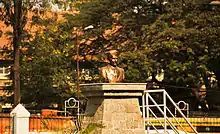
- Sir Mokshagundam Visvesvarayya (1861–1962), recipient of Bharat Ratna and Knighthood, eminent engineer and statesman[8]
- Thomas Kailath, emeritus professor of engineering at Stanford University, winner of the IEEE Shannon Award and US National Medal of Science[47]
- C. Kumar N. Patel, Vice Chancellor for Research at the University of California, Los Angeles, inventor of the carbon-dioxide laser, winner of the United States National Medal of Science[8]
- Baburao Govindrao Shirke, Founder of B. G. Shirke & Company[48]
- Nitin Paranjpe, President of the Foods & Refreshment Division of Unilever[49]
- Laxman Narasimhan, an Indian-American business executive, who is the chief executive of Reckitt Benckiser, having previously been chief commercial officer at PepsiCo.
- Rajiv Bajaj, Managing Director of Bajaj Auto: One of the largest two-wheeler manufacturer in India[50]
- Sumant Moolgaokar, Padma Bhushan, he was an Indian industrialist, known as architect of Tata Motors. He was the chief executive of Tata Engineering and Locomotive Company (TELCO). He also remained Vice-Chairman of Tata Steel and served as non-executive chairman of Maruti Suzuki.
- Ramesh Raskar, Associate Professor at Massachusetts Institute of Technology, Director of MIT Media Lab's Camera Culture group and developer of a high-speed femto-camera that captures pictures of light.[51]
- Sandeep Johri, technology executive and serial entrepreneur, CEO of Tricentis[52]
- Trimbak Parchure, former emeritus professor at COEP. M.S, PhD University of Florida, United States
- Vijay Kelkar, Padma Vibhushan, Advisor to the Finance Minister, Government of India in the rank of a Minister of State, Chairman, National Stock Exchange of India[8]
- Aravind Joshi, emeritus professor of Computer and Cognitive Science at the University of Pennsylvania.
- Rahul Panat, Associate Professor of Mechanical Engineering at Carnegie Mellon University, Director of Advanced Manufacturing and Materials Laboratory and pioneer in 3D printed microelectronics for brain computer interfaces, Li-ion batteries, and sensors.[51]
- Lila Poonawalla, Padma Shri, an Indian industrialist, philanthropist, humanitarian. First Woman Engineer graduating from the Mechanical stream.
- Sanjay Govind Dhande, Padma Shri, an Indian engineer and educationist. He was director of the Indian Institute of Technology Kanpur.
- Gaur Gopal Das, an Indian monk, motivational speaker and lifestyle coach.
Controversies
Land acquisition
In December 2005 the Pune Municipal Corporation asked the college for some of its land for road widening. This led to considerable outrage amongst students, and the issue was under heated debate. It was pointed out that the college was classified as a 'heritage complex' by the state government.[53]
Renaming
1854–1870: Poona Engineering Class and Mechanical School[8][54]
1871–1911: Government Science College (Agriculture and Botany Classes)[8][54]
1911–2003: Government College of Engineering, Pune[8][54]
2003–2006: Pune Institute of Engineering and Technology[8]
2006 onwards: College of Engineering, Pune
In 2000, COEP claimed independence from the state government and was declared an autonomous institute in 2003.[7][8] Considerable confusion ensued over a proposed name change from COEP to Pune Institute of Engineering and Technology (PIET) which was strongly opposed by alumni and students. The newly autonomous entity's name was rolled back to COEP in November 2005.[55]
Road widening and flyover construction
The College was at loggerheads with the Pune Municipal Corporation over the proposed construction of a flyover in front of the college, that would not only deface the renovated Main Hall but would also encroach upon the College's premises. The College and its alumni were of the opinion that the flyover would not, in any way, decongest the traffic plying through that road.[56][57] It also considered the flyover as serious danger to the safety of the pedestrians, including students, as it was not considered in the plan of the flyover.[58] Many civic activists and organisations supported the College's opinion.[56][59][60]
See also
References
- Mandatory, Disclosure. "Annexure A" (PDF). 40th Meeting of Board of Governors of COEP. College of Engineering, Pune. Retrieved 7 March 2019.
- Henry Herbert Dodwell (1929). The Cambridge History of the British Empire. CUP Archive.
- College of Engineering, Pune, Official Website. "History". History of College. College of Engineering, Pune. Retrieved 9 December 2011.
- A.A. Ghatol, S. S. Kaptan, A. A. Ghatol, K. K. Dhote (1 January 2004). Industry Institute Interaction. Sarup & Sons. pp. 61-. ISBN 978-81-7625-486-1.
- Shastri, Padmaja (4 April 2006). "'COEPians' discover alumni treasure move". The Times of India. Retrieved 31 July 2014.
- The Bombay University Calendar for the year 1866–67. pp. 152–.
- India, PRwire (27 February 2008). "College of Engineering, Pune to Host Honeywell-Nobel Laureate Lecture Series". India PRwire. Archived from the original on 10 February 2012. Retrieved 21 December 2011.
- Times of India, Newsletter (16 December 2004). "150 years of engineering excellence". The Times of India. Retrieved 9 December 2011.
- Rheedea (2010). A Centennial Remembrance of Two Great Botanists (PDF). New Delhi: Department of Science and Technology, Government of India. pp. 135–136. Archived from the original (PDF) on 26 April 2012. Retrieved 9 January 2012.
- The Asiatic annual register; or, A view of the history of Hindustan,: and of the politics, commerce, and literature of Asia, ... Printed for J. Debrett, Piccadilly, by Andrew Wilson, the Asiatic Press, Wild Court. 1859. pp. 74–.
- Paulo B. Lourenço. Proceedings of the 5th International Conference on Structural Analysis of Historical Constructions: Possibilities of numerical and experimental techniques. Macmillan India. pp. 1811–1813. ISBN 978-1-4039-3157-3.
- Suresh Kant Sharma (2005). Encyclopaedia of Higher Education: Scientific and technical education. Mittal Publications. pp. 46-. ISBN 978-81-8324-017-8.
- The Asiatic annual register; or, A view of the history of Hindustan,: and of the politics, commerce, and literature of Asia, ... Printed for J. Debrett, Piccadilly, by Andrew Wilson, the Asiatic Press, Wild Court. 1859. pp. 77-.
- Department of Higher Education, Government of India. "Technical Education". Technical Education in India. Ministry of Human Resource Development. Archived from the original on 21 December 2010. Retrieved 8 December 2011.
- "COEP heritage Main Building's restoration complete". Sakaal Times. 20 March 2012. Archived from the original on 20 July 2012.
- "COEP Accreditation 1". Archived from the original on 23 April 2016. Retrieved 26 November 2014.
- "NBA WA". Archived from the original on 6 February 2015. Retrieved 26 November 2014.
- "COEP Accreditation 2" (PDF).
- "Admission process to autonomous engg colleges from today". The Indian Express. pune. Indian express news service. 18 June 2009.
- "COEP cutoff" (PDF). coep.org.in. Retrieved 11 February 2020.
- "From 2016, Maharashtra will use CET for engineering admissions". Hindustan Times.
- "Archived copy". Archived from the original on 9 August 2018. Retrieved 25 July 2020.CS1 maint: archived copy as title (link)
- "Welcome to College of Engineering, Pune | College of Engineering, Pune". coep.org.in.
- "National Institutional Ranking Framework 2020 (Overall)". National Institutional Ranking Framework. Ministry of Education. 11 June 2020.
- "National Institutional Ranking Framework 2020 (Engineering)". National Institutional Ranking Framework. Ministry of Education. 11 June 2020.
- "India's Top 150 Engineering Colleges In 2019". Outlook India. 6 June 2019.
- Pushkarna, Vijaya (8 June 2019). "Best colleges: THE WEEK-Hansa Research Survey 2019". The Week.
- Atal Ranking of Institutions on Innovation Achievement (ARIIA) 2020
- "COEP's 'MindSpark 14' to begin from Sept 19". Sakal Times. Archived from the original on 2 May 2016. Retrieved 11 October 2016.
- "Techfest 'MindSpark' to begin from Friday". The Times of India.
- "College of Engineering, Pune Regatta". Retrieved 24 February 2012.
- "Students prepare for COEP Regatta". 21 March 2015. Retrieved 22 August 2017.
- TopNews (24 February 2009). "VIT, COEP win Firodiya Karandak". Retrieved 26 January 2012.
- "COEP Impressions 2018 All Set To Take Place On 13th −15th December". 10 December 2018. Retrieved 13 November 2019.
- "Kalam's visit packed with students' interaction". The Times of India. 29 January 2005. Retrieved 17 January 2012.
- "Welcome to NicheEntertainment.com". nicheentertainment.com.
- Guinness, Book of World Records. "Most people skipping on the same rope". Listing World Records. Guinness World Records. Retrieved 31 October 2012.
- Guinness, Book of World Records. "Longest Painting by Numbers". Listing World Records. Guinness World Records. Archived from the original on 25 January 2013. Retrieved 31 October 2012.
- Guinness Book of world record. "Most people solving Rubik's cube". Guinness world record. Guinness Book of world records.
- The Indian Express. "COEP sets another record, over 3,000 solve Rubik's Cube in 30 minutes". The Indian Express.
- Syndication, DNA (19 February 2013). "COEP sweeps Baja SAE India Contest". DNASyndication. Retrieved 20 February 2013.
- "COEP Team Nemesis Racing continues to make records at Baja 2016 | College of Engineering, Pune". www.coep.org.in. Retrieved 9 March 2017.
- "COEP Team Nemesis Racing continues to make records at Baja 2017 | College of Engineering, Pune". www.coep.org.in. Retrieved 9 March 2017.
- "Robot Study Circle | College of Engineering, Pune". coep.org.in.
- "College of Engineering Pune wins Robocon, to represent India in Tokyo". The Times of India. Retrieved 9 March 2017.
- "Team CSAT".
- Economic Times (4 October 2014). "Pune-educated Stanford professor Thomas Kailath, wins US National Medal of Science". Retrieved 5 October 2014.
- "SHRI BABURAO GOVINDRAO SHIRKE". The Journal of Engineering Education.
- "Nitin was appointed as President of the Foods & Refreshment Division per 1st January 2018". Unilever.
- Bajaj, Finserv. "Company overview". List of chief people of the company. Bajaj Group. Archived from the original on 1 January 2012. Retrieved 11 January 2012.
- CMU. "3D Printing of Microelectronic Devices". Research Article in Science Advances. American Association for Advancement of Science.
- Bloomberg Profile on Tricentis
- Times of India (11 September 2003). "COEP alumni oppose land acquisition". The Times of India. Retrieved 9 December 2011.
- Status, Concerns and Recommendations, Profile of Engineering Education in India. The Poona College (PDF). p. 24.
- "Come June, COEP to have two new courses in MTech".
- Times of India (23 April 2012). "COEP flyover plan triggers debate". The Times of India. Retrieved 23 April 2012.
- "Was College of Engineering, Pune flyover okayed in a hurry?". The Times of India. 24 October 2012. Retrieved 24 October 2012.
- Indian, Express (12 January 2012). "Flyover runs into COEP roadblock". The Indian Express. Retrieved 29 April 2012.
- Pune, Mirror (29 April 2012). "Getting past history". Pune Mirror. Retrieved 29 April 2012.
- Sakal, Times (22 April 2012). "Flyovers near COEP won't serve any purpose: Experts". Sakal Times. Archived from the original on 19 September 2012. Retrieved 29 April 2012.
External links
- College of Engineering, Pune – Our Official web site
